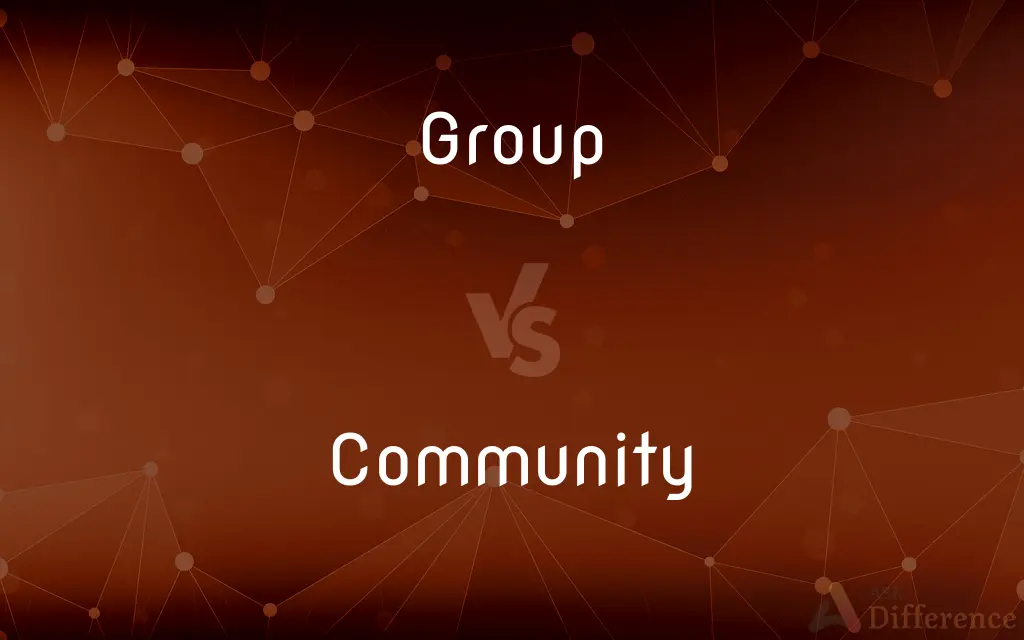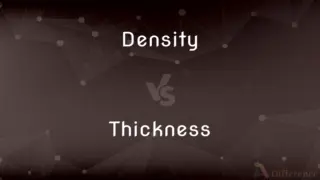Group vs. Community — What's the Difference?
By Tayyaba Rehman & Maham Liaqat — Updated on April 17, 2024
Group refers to a collection of individuals who are linked by common interests or characteristics, often with a defined purpose, whereas a community is a larger social unit sharing common values, traditions, or identity.

Difference Between Group and Community
Table of Contents
ADVERTISEMENT
Key Differences
A group is usually defined by its specific purpose or goal, such as a project team or a study group, each member playing a specific role towards a collective objective. On the other hand, a community is broader, encompassing people who may not have a singular, specific purpose but share a wider array of social, cultural, or historical commonalities.
Group interactions are often more structured around their objectives, with communication and activities designed to achieve specific outcomes. Whereas, community interactions are generally more organic, fostering relationships and a sense of belonging among its members based on shared experiences and mutual support.
Membership in a group is typically more formal and defined, with clear entry and exit criteria. In contrast, becoming part of a community might be more fluid, based on geographical, cultural, or emotional ties rather than strict guidelines.
Groups are often smaller and more temporary than communities; they may disband once their specific goals are met. Communities, however, tend to have a more enduring presence, evolving over time while maintaining continuity through shared heritage and long-term relationships.
In terms of influence, a group's impact is usually direct and confined to its specific goals, such as completing a project. Meanwhile, a community influences broader societal norms and values, often shaping the environment in which groups operate.
ADVERTISEMENT
Comparison Chart
Size
Typically smaller
Generally larger
Duration
Often temporary
Usually long-standing
Membership
Formal, with specific criteria
Informal, based on broader ties
Purpose
Specific, goal-oriented
Broad, often social or cultural
Interaction Type
Structured around objectives
Organic, fostering mutual support
Compare with Definitions
Group
A number of people or things that are located, gathered, or classed together.
A group of students gathered for a study session.
Community
A feeling of fellowship with others, as a result of sharing common attitudes, interests, and goals.
The online gaming community is very active.
Group
A commercial organization.
The company is part of a larger multinational group.
Community
A group of nations having common interests.
The international community must address climate change.
Group
A subdivision of a musical form.
The third group of the sonata brings back the original theme.
Community
A group of interdependent organisms of different species growing or living together in a specified habitat.
Coral reefs are vibrant marine communities.
Group
A set of individuals with a common purpose within a larger organization.
The management group meets every Monday.
Community
A group of people living in the same place or having a particular characteristic in common.
The local community was involved in the festival.
Group
A combination of atoms having a recognizable identity in a number of compounds.
The methyl group is part of many organic compounds.
Community
A group of people with a common religious faith.
The Jewish community in New York is very diverse.
Group
An assemblage of persons or objects gathered or located together; an aggregation
A group of dinner guests.
A group of buildings near the road.
Community
A community is a social unit (a group of living things) with commonality such as norms, religion, values, customs, or identity. Communities may share a sense of place situated in a given geographical area (e.g.
Group
A set of two or more figures that make up a unit or design, as in sculpture.
Community
A group of people living in the same locality and under the same government.
Group
A number of individuals or things considered or classed together because of similarities
A small group of supporters across the country.
Community
The district or locality in which such a group lives.
Group
(Linguistics) A category of related languages that is less inclusive than a family.
Community
A group of people having common interests
The scientific community.
The international business community.
Group
A military unit consisting of two or more battalions and a headquarters.
Community
A group viewed as forming a distinct segment of society
The gay community.
The community of color.
Group
A unit of two or more squadrons in the US Air Force, smaller than a wing.
Community
Similarity or identity
A community of interests.
Group
Two or more atoms behaving or regarded as behaving as a single chemical unit.
Community
Sharing, participation, and fellowship
A sense of community.
Group
A column in the periodic table of the elements.
Community
Society as a whole; the public.
Group
(Geology) A stratigraphic unit, especially a unit consisting of two or more formations deposited during a single geologic era.
Community
A group of organisms interacting with one another and with the environment in a specific region.
Group
(Mathematics) A set, together with a binary associative operation, such that the set is closed under the operation, the set contains an identity element for the operation, and each element of the set has an inverse element with respect to the operation. The integers form a group under the operation of ordinary addition.
Community
The region occupied by a group of interacting organisms.
Group
Of, relating to, constituting, or being a member of a group
A group discussion.
A group effort.
Community
(countable) A group sharing a common understanding, and often the same language, law, manners, and/or tradition.
Group
To place or arrange in a group
Grouped the children according to height.
Community
(countable) A residential or religious collective; a commune.
Group
To belong to or form a group
The soldiers began to group on the hillside.
Community
A group of interdependent organisms inhabiting the same region and interacting with each other.
Group
A number of things or persons being in some relation to one another.
There is a group of houses behind the hill;
He left town to join a Communist group
A group of people gathered in front of the Parliament to demonstrate against the Prime Minister's proposals.
Community
A group of people interacting by electronic means for educational, professional, social, or other purposes; a virtual community.
Group
(group theory) A set with an associative binary operation, under which there exists an identity element, and such that each element has an inverse.
Community
(uncountable) The condition of having certain attitudes and interests in common.
Group
An effective divisor on a curve.
Community
Common enjoyment or possession; participation.
A community of goods
Group
A (usually small) group of people who perform music together.
Did you see the new jazz group?
Community
Common character; likeness.
Group
(astronomy) A small number (up to about fifty) of galaxies that are near each other.
Community
Commonness; frequency.
Group
(chemistry) A column in the periodic table of chemical elements.
Community
A local area within a county or county borough which is the lowest tier of local government, usually represented by a community council or town council, which is generally equivalent to a civil parish in England.
Group
(chemistry) A functional group.
Nitro is an electron-withdrawing group.
Community
Common possession or enjoyment; participation; as, a community of goods.
The original community of all things.
An unreserved community of thought and feeling.
Group
(sociology) A subset of a culture or of a society.
Community
A body of people having common rights, privileges, or interests, or living in the same place under the same laws and regulations; as, a community of monks. Hence a number of animals living in a common home or with some apparent association of interests.
Creatures that in communities exist.
Group
(military) An air force formation.
Community
Society at large; a commonwealth or state; a body politic; the public, or people in general.
Burdens upon the poorer classes of the community.
Group
(geology) A collection of formations or rock strata.
Community
Common character; likeness.
The essential community of nature between organic growth and inorganic growth.
Group
(computing) A number of users with the same rights with respect to accession, modification, and execution of files, computers and peripherals.
Community
Commonness; frequency.
Eyes . . . sick and blunted with community.
Group
An element of an espresso machine from which hot water pours into the portafilter.
Community
A group of people living in a particular local area;
The team is drawn from all parts of the community
Group
(music) A number of eighth, sixteenth, etc., notes joined at the stems; sometimes rather indefinitely applied to any ornament made up of a few short notes.
Community
A group of people having ethnic or cultural or religious characteristics in common;
The Christian community of the apostolic age
He was well known throughout the Catholic community
Group
(sports) A set of teams playing each other in the same division, while not during the same period playing any teams that belong to other sets in the division.
Community
Common ownership;
They shared a community of possessions
Group
(business) A commercial organization.
Community
A group of nations having common interests;
They hoped to join the NATO community
Group
(transitive) To put together to form a group.
Group the dogs by hair colour
Community
The body of people in a learned occupation;
The news spread rapidly through the medical community
Group
(intransitive) To come together to form a group.
Community
Agreement as to goals;
The preachers and the bootleggers found they had a community of interests
Group
A cluster, crowd, or throng; an assemblage, either of persons or things, collected without any regular form or arrangement; as, a group of men or of trees; a group of isles.
Community
A district where people live; occupied primarily by private residences
Group
An assemblage of objects in a certain order or relation, or having some resemblance or common characteristic; as, groups of strata.
Community
(ecology) a group of interdependent organisms inhabiting the same region and interacting with each other
Group
A variously limited assemblage of animals or plants, having some resemblance, or common characteristics in form or structure. The term has different uses, and may be made to include certain species of a genus, or a whole genus, or certain genera, or even several orders.
Group
A number of eighth, sixteenth, etc., notes joined at the stems; - sometimes rather indefinitely applied to any ornament made up of a few short notes.
Group
To form a group of; to arrange or combine in a group or in groups, often with reference to mutual relation and the best effect; to form an assemblage of.
The difficulty lies in drawing and disposing, or, as the painters term it, in grouping such a multitude of different objects.
Group
Any number of entities (members) considered as a unit
Group
(chemistry) two or more atoms bound together as a single unit and forming part of a molecule
Group
A set that is closed, associative, has an identity element and every element has an inverse
Group
Arrange into a group or groups;
Can you group these shapes together?
Group
Form a group or group together
Common Curiosities
How does a community differ from a group in terms of membership?
Community membership is often based on broader, more fluid criteria such as geographical or cultural ties, unlike the more formal criteria for group membership.
How do the objectives of a group differ from those of a community?
Group objectives are usually specific and temporary, whereas community objectives are broader and more enduring.
What kind of interaction fosters a community?
Interactions in communities are more organic, focusing on mutual support and shared experiences.
What is the role of communication in a group versus a community?
In groups, communication is typically goal-oriented, while in communities, it fosters relationships and belonging.
How is the impact of a group different from that of a community?
A group's impact is generally limited to its specific goals, while a community impacts broader societal norms and values.
Can a group become a community?
Yes, a group can evolve into a community if it develops a broader sense of shared identity and long-term interactions.
What kind of interaction is common in groups?
Interactions in groups are structured and revolve around achieving specific objectives.
Are all groups goal-oriented?
While most groups are formed around specific goals, some may simply share common interests without a defined objective.
How do entry and exit differ in a group and a community?
Entry into a group is often formal with clear criteria, whereas entering a community can be more organic and based on subjective factors.
What defines a group?
A group is defined by its specific purpose and structured interactions among its members.
What makes a community more enduring than a group?
Communities are more enduring due to their broad, shared values and the continual development of relationships.
What happens when a group disbands?
When a group disbands, its members may leave the collective setup, often after achieving the set goals.
Can an individual belong to multiple groups and communities?
Yes, individuals often belong to multiple groups and communities simultaneously, each serving different aspects of their social needs.
What is the significance of a community in a person's life?
Communities play a crucial role in shaping an individual's identity and providing a supportive environment.
How does a community evolve over time?
Communities evolve by adapting to changes in societal norms and by integrating new members and ideas while maintaining their core identity.
Share Your Discovery

Previous Comparison
Shovel vs. Trowel
Next Comparison
Density vs. ThicknessAuthor Spotlight
Written by
Tayyaba RehmanTayyaba Rehman is a distinguished writer, currently serving as a primary contributor to askdifference.com. As a researcher in semantics and etymology, Tayyaba's passion for the complexity of languages and their distinctions has found a perfect home on the platform. Tayyaba delves into the intricacies of language, distinguishing between commonly confused words and phrases, thereby providing clarity for readers worldwide.
Co-written by
Maham Liaqat













































